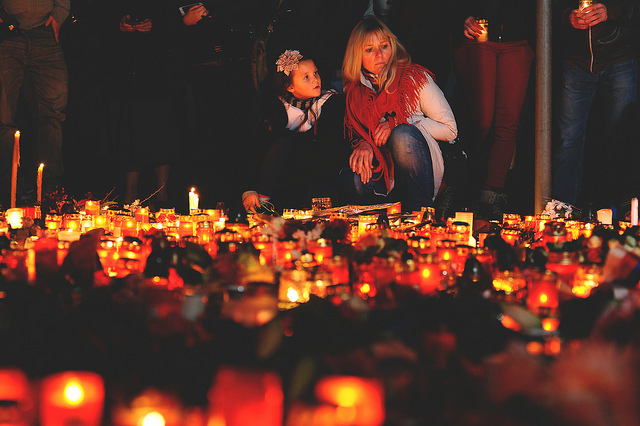
I’m not going to repeat the events of the carnage that took place in Paris two weeks ago since we all know that only too well.
I’m not going to make claims such as “terrorism has no religion,” even though I firmly believe it.
I’m not here to talk about whether Paris was worse than Beirut or Baghdad. Death is not a competition that ends with whichever nation can claim the most bodies and deserves the most sympathies.
However, I do want to talk about selective humanity.
I direct my thoughts towards those who post long status updates and tweets about how the media is ignoring Syria/Iraq/Palestine/Middle East/Afghanistan and instead, focusing on the countries where white lives are lost.
While I completely agree and sympathize, I want offer some questions for you to ask yourself before making any further comment:
What do I know about Syria and Iraq? And more importantly, what do I know about ISIS and its motives? Are they more politically or religiously driven?
Would I have known or posted about the Beirut and Baghdad bombings if the Paris carnage hadn’t taken place the day after it? Have I ever bothered to dig to the root of the Middle East conflict?
Do I know anything about the Russian plane that was brought down only recently? What knowledge do I have of USA/Russia’s involvement in Syria?
Do I know who Bashar al-Assad is?
Most important of all, when or if I ever hear of another attack in Syria, do I post statuses dedicated to its victims with hashtags such as #PrayForSyria?
The problem with selective humanity is that we all follow it.
It’s easy to post statuses about the media channels not covering the wars in Middle East and Afghanistan. But no one ever makes an effort to find out about these conflicts either.
The problem is: the media cares as much as the world does. That’s how it works; they show us what we want to see.
It’s hypocritical of us to point fingers at the media channels for not informing us about the Middle East. Because honestly, would we really give it a second thought if they reported the bombing that takes place in Syria every single day? The Middle East has become just another name we throw around to guilt each other out of talking about atrocities we deem less worthy somehow.
A friend who was particularly angry about the attention Paris was receiving constantly kept posting about Beirut and Baghdad. I asked her if she can locate Beirut on the map and she responded by saying, “It’s somewhere in the Middle East.”
Well, that doesn’t quite cover it, so here’s a little about Beirut. It’s the capital of Lebanon. Where is Lebanon on the map? It shares a border with Israel and Syria. That’s why it’s often found at the centre of conflicts. On November 12, ISIS targeted the southern suburb of Burj al-Barajneh, a stronghold of the Shia Islamist Hezbollah movement.
How do I know this? Well, I am interested enough to look deeper. I also don’t wait for the media to inform me about world affairs.
What I’m trying to say is that before we start storming the internet with #prayfortheworld and #seletivehumanity, let’s think about how we react to atrocities that are happening everyday around us.
The funny thing is, in most cases, it’s those of us who keep talking about Beirut and Baghdad who have absolutely no idea what is actually happening there. It’s so easy to pick up buzzwords from social media page and use them as a shield against an outpouring of sympathy in reaction to events like the ones that happened in Paris.
I agree that the media isn’t covering the effects of the conflict in some places with as much zeal as it covered Paris. But we should stop expecting them to.
The media won’t tell us about it. They won’t keep reporting the same story day after day. They should—but they won’t. So why don’t we try to learn about these regions before we try to change the world through our social media campaigns?
Beirut and Baghdad only got some leftover attention because those attacks happened around the same time as the Paris attacks. What about the rest of the world?
Do you know about the recent escalation of violence in Palestine in the past six weeks? Do you know about the current situation in Libya? Do you know about Yemen? Do you know about the illegal United States aggression in Iraq? Do you know about the permanent US war in Afghanistan?
Maybe, in a way, it’s a good thing the media has been constantly reporting the situation in Paris. At least it reminds us that there are other countries in the world being targeted too.
So let’s do something.
Instead of directing all our energy towards berating people and media about giving attention to Paris and not Beirut and Baghdad, let’s try to learn a bit about the Middle East.
There are dozens of twitter pages and news apps that are dedicated solely towards reporting these conflicts. Find out what Hezbollah is. Research on the ideology of ISIS. Explore the roots of the Middle East crisis.
If we did, we might be justified in our criticism of others for not caring about Beirut and Baghdad.
Let’s be the voice that we claim the media should be.
~
Relephant read:
The Millionth Monkey Activist.
~
Author: Aqsa Sajjad
Editor: Khara-Jade Warren
Image: Bianca Dagheti/ Flickr
~










Read 2 comments and reply